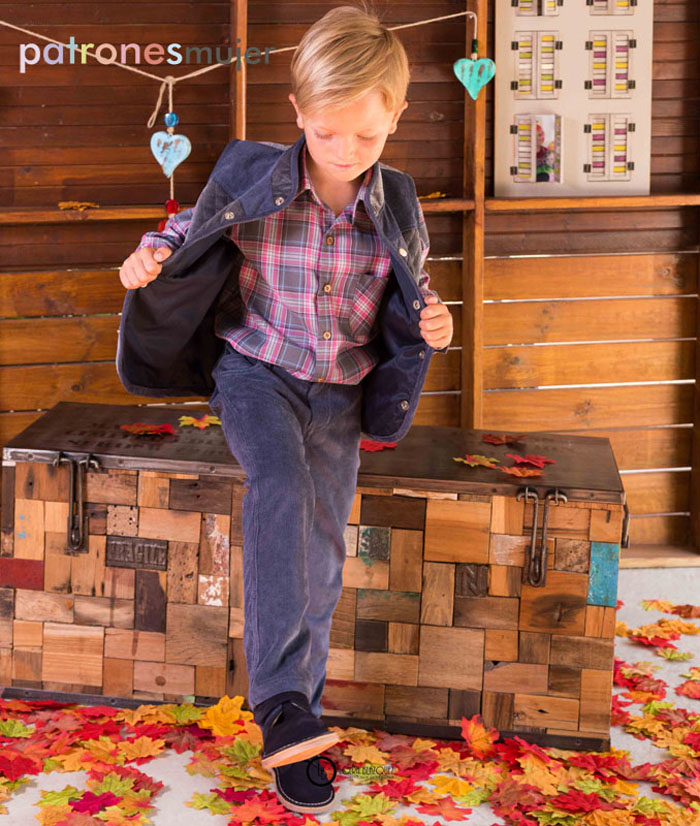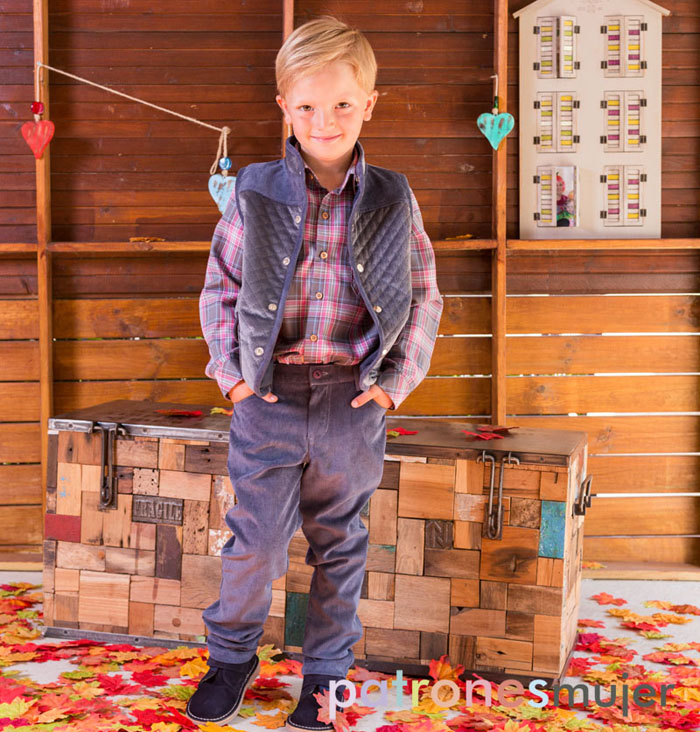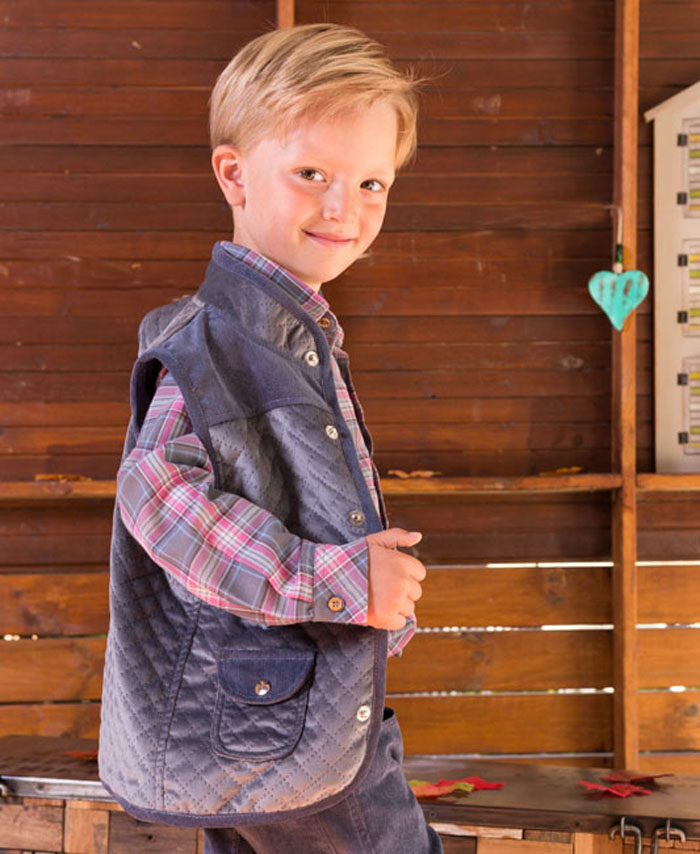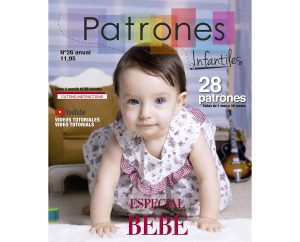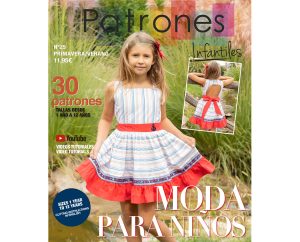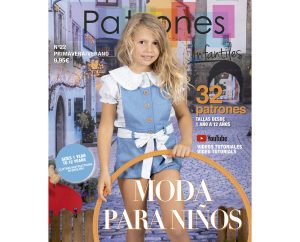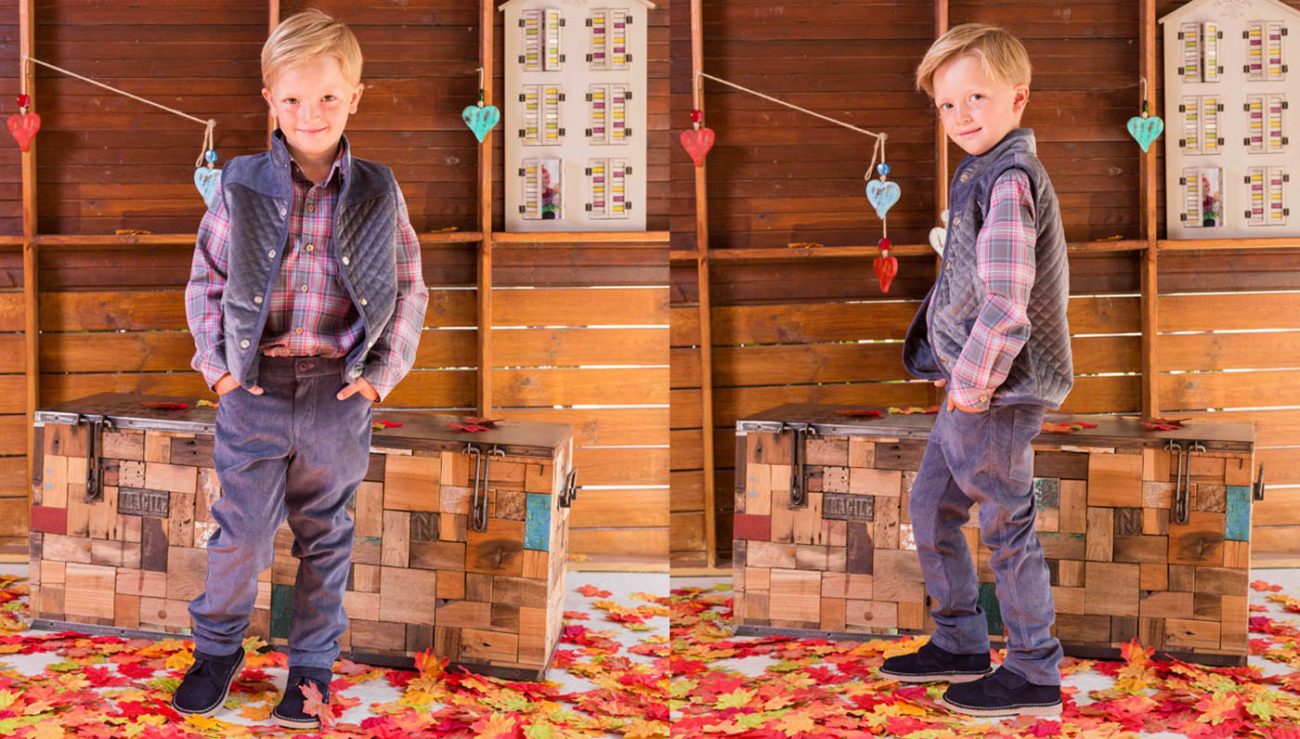
CONSEJOS
– Los tejidos recomendados para hacer la camisa son: Viyela, algodón y popelín.
– Los tejidos recomendados para hacer el pantalón son: Pana, vaquero y sarga.
– Los tejidos recomendados para hacer el chaleco son: Acolchado y el forro acetato.
– Está en las tallas de 3 años a 12 años.
– Dificultad: Media.
TIPS
– Recommended fabric for the shirt is viyella, cotton and poplin.
– Recommended fabric for the pants is Corduroy, jeans and twill.
– Recommended fabric for the vest is quilted cotton and acetate lining.
– Available in sizes 3 to 12 years.
– Difficulty: Medium
VIDEO TUTORIAL
MATERIALES/MATERIALS
Camisa/shirt
Género/main fabric:
85 cm para talla 3-4 años/85 cm for size 3-4 years
95 cm para tallas 5-6 años/95 cm for size 5-6 years
1,05 m para tallas 7-8 años/1,05 m for sizes 7-8 years
1,25 m para tallas 10-12 años/1,25 m for sizes 10-12 years
Entretela/Fusible Interfacing: 25 cm
Botone/Buttons:8
Pantalón/pants
Género/main fabric:
75 cm para talla 3-4 años/75 cm for size 3-4 years
80 cm para tallas 5-6 años/80 c m for size 5-6 years
1,05m para tallas 7-8 años/1,05 m for sizes 7-8 years
1,30 m para tallas 10-12 años/1,30 m for sizes 10-12 years
Forro/lining: 30 cm para todas las tallas/
Entretela/Fusible Interfacing: 25 cm
1 cremallera de 18 cm/A 18cm zipper
1 botón/1 button
Chaleco/vest
Género acolchado/Quilted fabric:
45 cm para talla 3-4 años/45 cm for size 3-4 years
50 cm para tallas 5-6 años/50 cm for size 5-6 years
55 cm para tallas 7-8 años/55 cm for sizes 7-8 years
65 cm para tallas 10-12 años/65 cm for sizes 10-12 years
Género pana/: 50 cm para todas las tallas/
Forro/lining:
50 cm para talla 3-4 años/50 cm for size 3-4 years
55 cm para tallas 5-6 años/55 cm for size 5-6 years
60 cm para tallas 7-8 años/60 cm for sizes 7-8 years
70 cm para tallas 10-12 años/70 cm for sizes 10-12 years
Automáticos/Snaps: 8
PATRÓN:
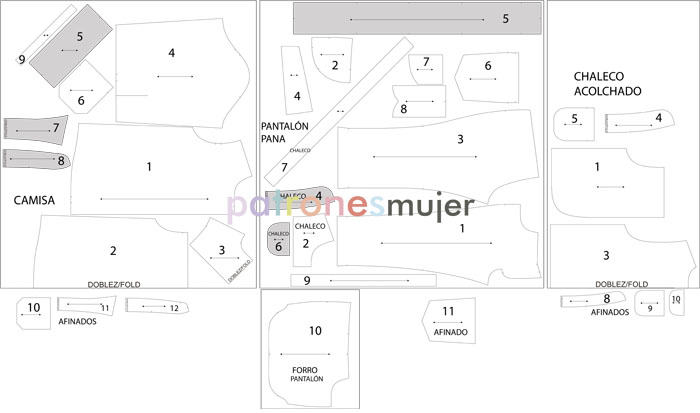
INSTRUCCIONES DE CORTE:
Camisa
– La pieza 1 es el delantero, cortar 2 veces de género (encarados).
– La pieza 2 es la espalda, cortar 1 vez de género (el patrón está a la mitad).
– La pieza 3 es el canesú espalda, cortar 1 vez de género (el patrón está a la mitad).
– La pieza 4 es la manga, cortar 2 veces de género (encarados).
– La pieza 5 es el puño, cortar 2 veces de género y 2 de entretela (encarados).
– La pieza 6 es el bolsillo, cortar 2 veces de género (encarados).
– La pieza 7 es el cuello pala, cortar 2 veces de género y 1 de entretela (el patrón está a la mitad).
– La pieza 8 es el pie de cuello, cortar 2 veces de género y 1 de entretela (el patrón está a la mitad).
– La pieza 9 es el bies remate abertura manga, cortar 2 veces de género.
– La piezas 10,11 y 12 son afinados, cortar en papel o cartón.
Pantalón
– La pieza 1 es el delantero, cortar 2 veces de género (encarados).
– La pieza 2 es el corte del bolsillo delantero, cortar 2 veces de género (encarados).
– La pieza 3 es la espalda, cortar 2 veces de género (encarados).
– La pieza 4 es el canesú espalda, cortar 2 veces de género (encarados).
– La pieza 5 es la cintura, cortar 1 vez de género y 1 de entretela.
– La pieza 6 es el bolsillo espalda, cortar 2 veces de género (encarados).
– La pieza 7 es el bolsillo cerillero, cortar 2 veces de género (encarados).
– La pieza 8 es el remate cremallera, cortar 1 vez de género.
– La pieza 9 es el pasador, cortar 1 vez de género.
– La pieza 10 es el fondo de bolsillo, cortar 1 vez de forro.
– La pieza 11 es el afinado, cortar en papel o cartón.
Chaleco
– La pieza 1 es el delantero, cortar 2 veces de género acolchado y 2 de forro (encarados).
– La pieza 2 es el canesú delantero, cortar 2 veces de género pana y 2 de forro (encarados).
– La pieza 3 es la espalda, cortar 1 vez de género acolchado y 1 de forro (el patrón está a la mitad).
– La pieza 4 es el cuello, cortar 1 vez de género acolchado, 1 de pana y 1 de entretela (el patrón está a la mitad).
– La pieza 5 es el bolsillo, cortar 2 veces de género acolchado.
– La pieza 6 es la cartera, cortar 4 veces de género pana y 2 de entretela.
– La pieza 7 es el bies remate, cortar 3 veces de género pana.
– La piezas 8,9 y 10 son afinados, cortar en papel o cartón.
CUTTING INSTRUCTIONS:
Shirt
– Piece number 1 is the front. Cut 2 (1 mirrored) from main fabric.
– Piece number 2 is the back. Cut 1 from main fabric, on the fold.
– Piece number 3 is the back yoke. Cut 1 from main fabric, on the fold.
– Piece number 4 is the sleeve. Cut 2 (1 mirrored) from main fabric.
– Piece number 5 is the cuff. Cut 2 (1 mirrored) from main fabric and 2 (1 mirrored) from interfacing.
– Piece number 6 is the pocket. Cut 2 (1 mirrored) from main fabric.
– Piece number 7 is the collar. Cut 2 from main fabric and 1 from the fusible interfacing, on
the fold.
– Piece number 11 is the neckband base. Cut 2 from main fabric and 1 from fusible interfacing, on the fold.
– Piece number 8 is the bias tape used to finish the sleeve placket. Cut 2 from main fabric.
– Pieces 10, 11 and 12 are pieces without seam allowance. Use them to mark the fabric to know where to sew. You can use paper or cardstock.
Pants
– Piece number 1 is the front. Cut 2 (1 mirrored) from main fabric.
– Piece number 2 is the front pocket. Cut 2 (one mirrored) from main fabric.
– Piece number 3 is the back. Cut 2 (1 mirrored) from main fabric.
– Piece number 4 is the back yoke. Cut 2 (1 mirrored) from main fabric.
– Piece number 5 is the waistband. Cut 1 from main fabric and 1 from fusible interfacing.
– Piece number 6 is the back pocket. Cut 2 (1 mirrored) from main fabric.
– Piece number 7 is another pocket. Cut 2 (1 mirrored) from main fabric.
– Piece number 8 is the zipper binding. Cut 1 from main fabric.
– Piece number 9 is the sleeve button band. Cut 1 from main fabric.
-Piece number 10 is the pocket lining. Cut 1 from lining.
– Piece number 11 is a piece without seam allowance. Use it to mark the fabric to know where to sew. You can use paper or cardstock.
Vest
– Piece number 1 is the front. Cut 2 (1 mirrored) from quilted fabric and 2 (1 mirrored) from lining.
– Piece number 2 is the front yoke. Cut 2 (1 mirrored) from corduroy and 2 (1 mirrored) from lining.
– Piece number 3 is the back. Cut 1 from quilted fabric and 1 from lining, on the fold.
– Piece number 4 is the neckband. Cut 1 from quilted fabric, 1 from corduroy and 1 from fusible interfacing, on the fold.
– Piece number 5 is the pocket. Cut 2 from quilted fabric.
– Piece number 6 is the “Cartera”. Cut 4 from corduroy fabric and 2 from interfacing.
– Piece number 7 is the bias tape. Cut 3 from corduroy fabric.
– Pieces number 8,9, and 10 are pieces without seam allowance. Use them to mark the fabric to know where to sew. You can use paper or cardstock.
DIBUJO TÉCNICO:
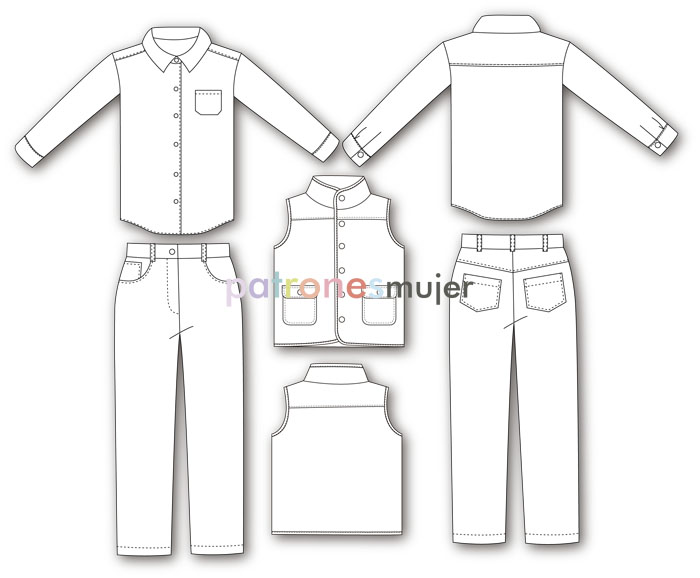
RESULTADO:
